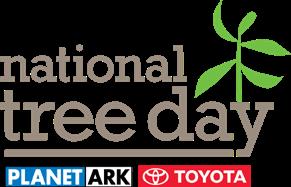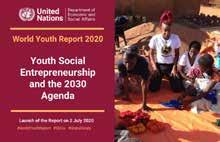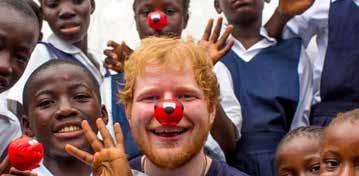
10 minute read
August
INTERNATIONAL DAYS INTERNATIONAL
DAYS AUGUST
Advertisement
1st August – National Tree Day National Tree Day was co-founded in 1996 by Planet Ark and Olivia Newton-John, and is Australia’s largest community tree planting and nature protection event. The ask for this Day is for one million new native trees and shrubs to be planted across the country. Each year, about 300,000 people volunteer their time to engage in the Day’s environmental activities and, particularly, to plant new trees. To get involved, find a site and contact the event organisers directly. Planet Ark arranges for Voluntary Workers Insurance to cover participants at registered public National Tree Day events and any registered public National Tree day activity taking place throughout the year.
4th August – National Aboriginal and Torres Strait Islander Children’s Day The date 4th August was historically used to celebrate communally the birthdays of Aboriginal and Torres Strait Islander children who were taken from their families at a young age, without knowing their birthday – the Stolen Generations. In 1988, National Aboriginal and Islander Children’s Day was established to celebrate the children of our First Nation peoples to give children confidence, make them feel special and included and, particularly for those children who face ongoing challenges stemming from colonisation and such effects as discrimination, poverty, systemic removal, intergenerational trauma, dislocation from land and culture, and community disempowerment. This Day is celebrated by all Australians and particularly by the over 500 different First Nations groups, each of which has distinctive cultures, beliefs and languages.
7th August – Jeans for Genes Day Every one in 20 kids face a birth defect or genetic disease, such as cancer, cystic fibrosis and lifethreatening metabolic disorders – with 12 kids born with such every minute worldwide. On the first Friday of August each year, Australians unite on Jeans for Genes Day by wearing their favourite jeans, donating money and purchasing merchandise to support genetic research. Organised by the Children’s Medical Research Institute (CMRI), the Day is characterised by schools, workplaces and public areas becoming a sea of denim in a united stance against childhood diseases and friends and colleagues try to outdo each other by wearing the most bizarre outfits.

9th August – International Day of the World’s Indigenous Peoples There are approximately 476 million Indigenous Peoples worldwide, in over 90 countries – 6 percent of the global population. Often lacking formal recognition over their lands, territories and natural resources, Indigenous People are often last to receive public investments in basic services and infrastructure, and face multiple barriers to participate fully in the formal economy, enjoy access to justice, and participate in political processes and decision making. While Indigenous Peoples own, occupy, or use a quarter of the world’s surface area, they safeguard 80 percent of the world’s remaining biodiversity. They hold vital ancestral knowledge and expertise on how to adapt, mitigate and reduce climate and disaster risks. International Day of the World’s Indigenous Peoples marks the date of the inaugural session of the Working Group on Indigenous Populations at the United Nations in 1982. Self-identification as indigenous or tribal is a fundamental criterion for determining the groups to which the provisions of the International Labour Organization’s Convention concerning Indigenous and Tribal Peoples in Independent Countries apply. Additional criteria that help to define Indigenous people include: • historical continuity with pre-invasion and/or pre-colonial societies that developed on their territories; • distinctiveness; • non-dominance; • a determination to preserve, develop and transmit to future generations their ancestral territories and identity as peoples in accordance with their own cultural patterns, social institutions and legal system. • a strong link to territories and surrounding natural resources; • distinct social, economic or political systems; and • distinct language, culture and beliefs. 12th August – International Youth Day International Youth Day celebrates and makes mainstream young peoples’ voices, actions, initiatives and their meaningful, universal and equitable engagement. It recognises the importance of youth participation in political, economic and social life and processes. Globally, here are 1.2 billion people aged 15 to 24 years, accounting for 16 per cent of the global population. By 2030 — the target year for the Sustainable Development Goals (SDGs) that make up the 2030 Agenda — the youth of today will be adults and the number of new youth will be nearly 1.3 billion. The Agenda highlights how youth social entrepreneurship can support young people’s employment and development while helping to accelerate the implementation of the SDGs


14th August – Red Nose Day Red Nose Day aims to save little lives and support families impacted by the death of a baby or child. The first National Red Nose Day was held in 1988, asking Australian to “get silly for a serious cause” — after a number of Sudden Infant Death associations and groups had been formed across Australia. Of approximately 300,000 births in 2018, there were 2,850 perinatal deaths, including 737 neonatal deaths (deaths within 28 days of birth) and 2,118 stillbirths. The rate of sudden unexpected death in infancy (SUDI), which includes sudden infant death and fatal sleeping accidents, has decreased by 85% from 1989 to 2018, largely due to education campaigns. The Day is to raise money for Sudden Infant Death Syndrome (SIDS) by wearing red noses and acting silly.

19th August – World Humanitarian Day World Humanitarian Day commemorates humanitarian workers killed and injured in the course of their work and acknowledges all aid and health workers who provide life-saving support and protection to people most in need. The Day marks the 2003 bomb attack on the Canal Hotel in Baghdad, Iraq, which killed 22 people, including the chief humanitarian in Iraq, Sergio Vieira de Mello. In 2019, humanitarian aid meant that: • 28.9 million children were vaccinated globally against measles; • 6.9 million children (6 - 59 months), pregnant and lactating women with acute malnutrition were newly admitted for treatment globally; • 32.2 million people were provided with access to safe water for drinking, cooking and personal hygiene; • 92.6 million children and caregivers worldwide accessed mental health and psychosocial support; and • 42.0 million livestock were reached with vaccination and treatment campaigns. In 2019, 483 aid workers were attacked, which lead to 125 deaths, 234 wounded and 124 kidnapped in a total of 277 separate incidents across, predominantly, Syria, South Sudan, Democratic Republic of Congo, Afghanistan, Central African Republic (CAR), Yemen and Mali.
21st August – International Day of Remembrance and Tribute to the Victims of Terrorism The General Assembly established 21st August as the International Day of Remembrance and Tribute to the Victims of Terrorism. This Day is to honour and support the victims and survivors of terrorism, and promote and protect the full enjoyment of their human rights and fundamental freedoms. Victims of terrorism continue to struggle to have their voices heard, their needs supported and their rights upheld. Feeling forgotten and neglected once the immediate aftermath of a terrorist attack fades, has profound consequences. Few Members States have the resources and capacity to fulfill the medium and long-term needs required for victims to fully recover, rehabilitate and integrate back into society. Victims can only recover and cope with their trauma through long-term multi-dimensional support, including physical, psychological, social and financial, in order to heal and live with dignity. The primary responsibility to support victims of terrorism and uphold their rights rests with Member States. The United Nations has an important role in supporting these States to implement Pillar I and IV of the UN Global Counter-Terrorism Strategy through standing in solidarity and providing support to victims, capacity building assistance, establishing networks and offering support to civil society organizations, particularly victims of terrorism associations, and encouraging Member States to promote, protect and respect the rights of victims. The United Nations has been working to provide resources and mobilize the international community to address the needs of victims of terrorism.


23rd August – International Day for the Remembrance of the Slave Trade and Its Abolition International Day for the Remembrance of the Slave Trade and its Abolition is celebratedon the 23rd August of each year. This Day was designated by UNESCO (United Nations Educational, Scientific and Cultural Organization) to memorialize the transatlantic slave trade. It marks the date of a 1791 uprising in Santo Domingo (now Haiti and the Dominican Republic) that played a crucial role in the abolition of the 16th to 19th century transatlantic slave trade. This Day is to inscribe the tragedy of the slave trade in the memory of all, to consider the historic causes, methods and consequences of this tragedy, and to analyse the interactions to which it has given rise between Africa,
Europe, the Americas and the Caribbean. Unfortunately, however, modern slavery continues – 40 million people are estimated to be severely exploited by other people for personal or commercial gain, such as making our clothes, serving our food, picking our crops, working in factories, or working in houses as cooks, cleaners or nannies. One in four are children, and near 75 per cent are women and girls.
29th August – International Day against Nuclear Tests Nuclear weapons testing began in 1945 and nearly 2,000 tests have subsequently been undertaken. On 2nd December 2009, the 64th session of the United Nations General Assembly declared 29th August the International Day against Nuclear Tests through the unanimous adoption of its Resolution 64/35. The Preamble of the resolution emphasizes that every effort should be made to end nuclear tests in order to avert devastating and harmful effects on the lives and health of people. The resolution in particular calls for increasing awareness about the effects of nuclear weapon test explosions or any other nuclear explosions and the need for their cessation as one of the means of achieving the goal of a nuclear-weapon-free world. The resolution was initiated by Kazakhstan together with several sponsors and cosponsors to commemorate the closure of the Semipalatinsk Nuclear Test Site on August 29th 1991. 30th August – International Day of the Victims of Enforced Disappearances On 30th August each year, organisations such as the United Nations and Amnesty International observe the International Day of the Victims of Enforced Disappearances where they play an active role in raising awareness that enforced disappearance is a crime and should not be used as a tool to deal with situations of conflict. An enforced (or forced) disappearance is when a person is secretly abducted or imprisoned by a state or political organisation, followed by a refusal to acknowledge the person’s fate and whereabouts, with the intent of depriving them of all rights, including the right to: • recognition as a person before the law; • liberty and security of the person; • not be subjected to torture and other cruel, inhuman or degrading treatment or punishment; • life, when the disappeared person is killed; • an identity; • a fair trial and to judicial guarantees; • an effective remedy, including reparation and compensation; • the truth regarding the circumstances of a disappearance. • protection and assistance to the family; • an adequate standard of living; • health; and • education. International Day of the Victims of Enforced Disappearances recognises enforced disappearance as a global problem that is largely the product of military dictatorships perpetrated in complex internal conflict situations, especially as a means of political repression of opponents. It is also to observe the International Convention for the Protection of All Persons from Enforced Disappearance by eradicating the practice of enforced disappearances and the harassment, illtreatment and intimidation of witnesses of disappearances or the relatives of persons who have disappeared.













